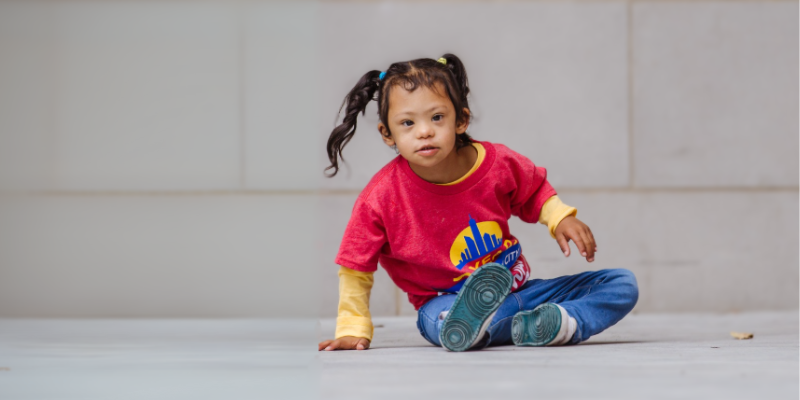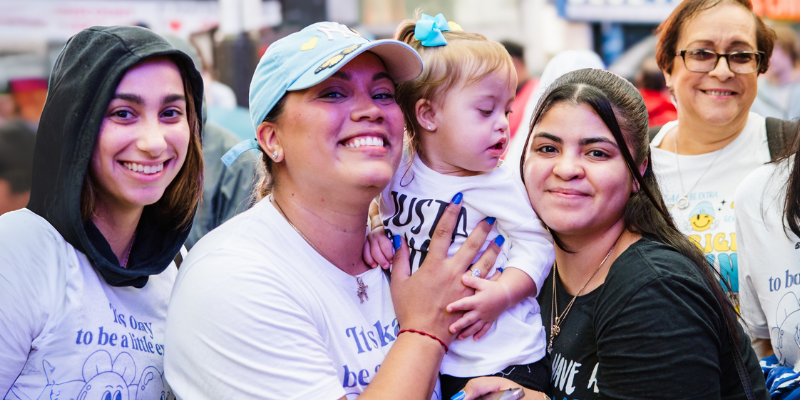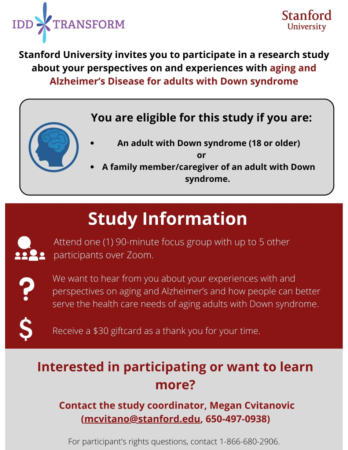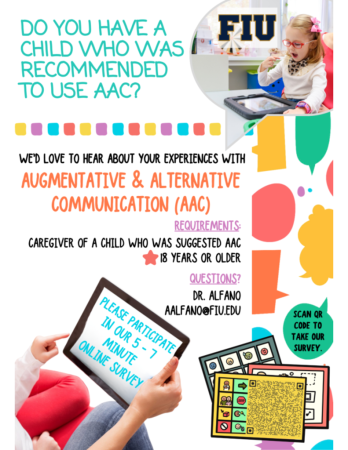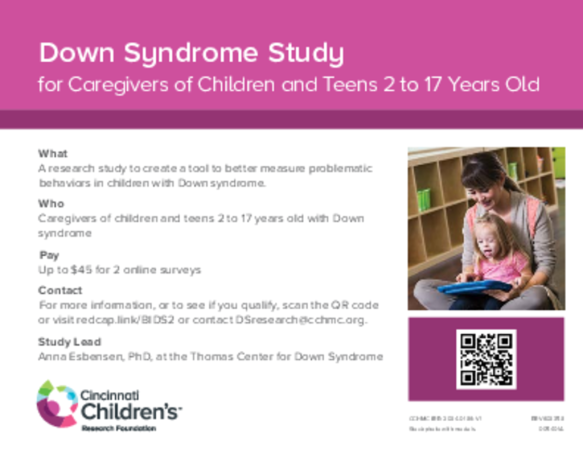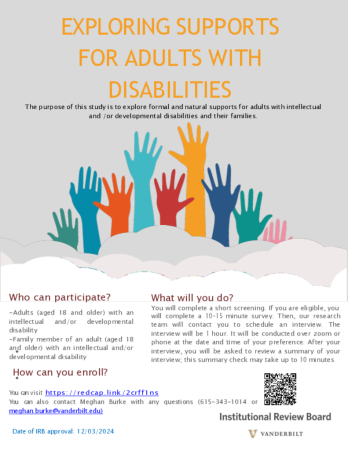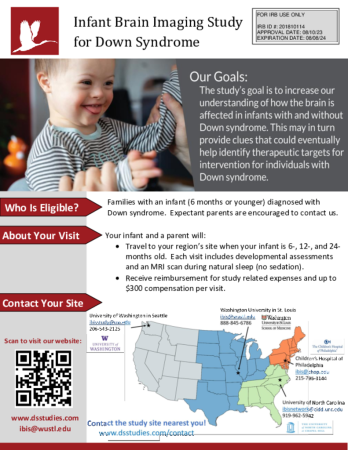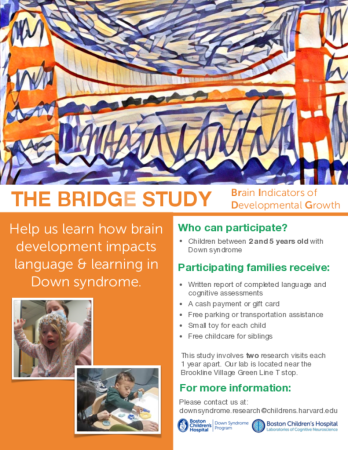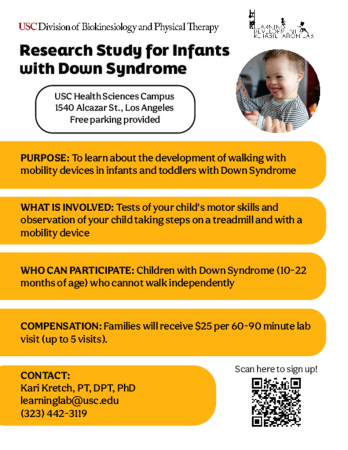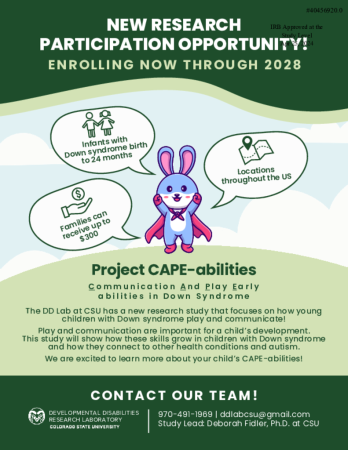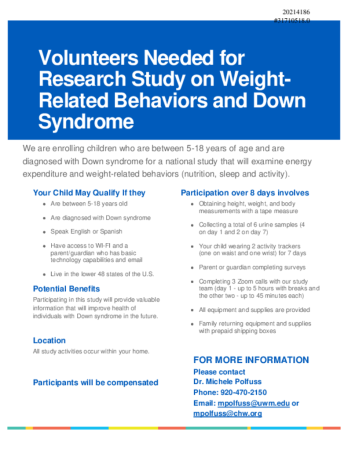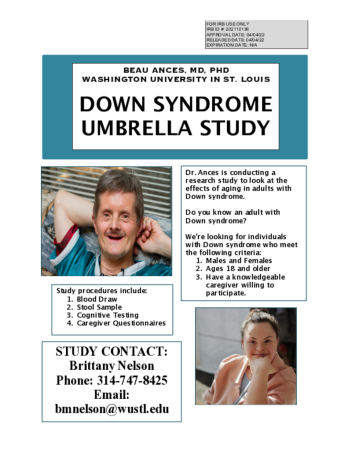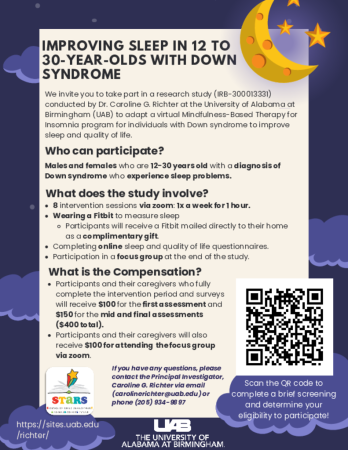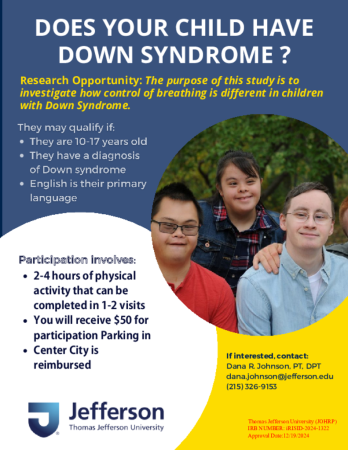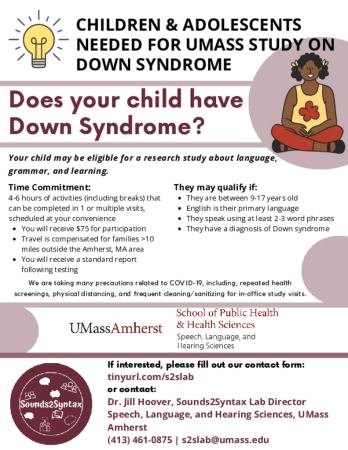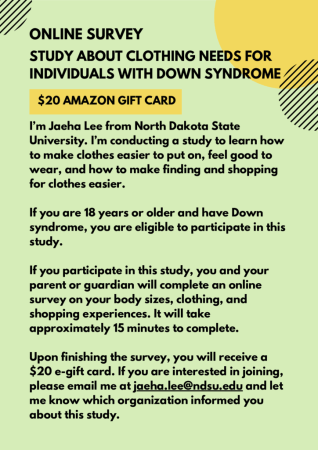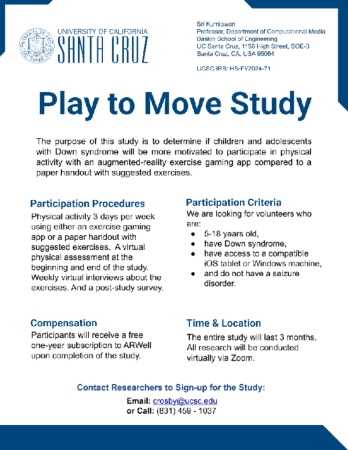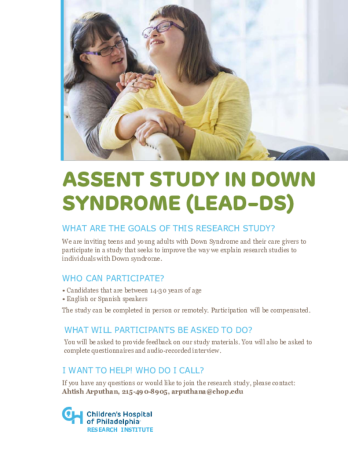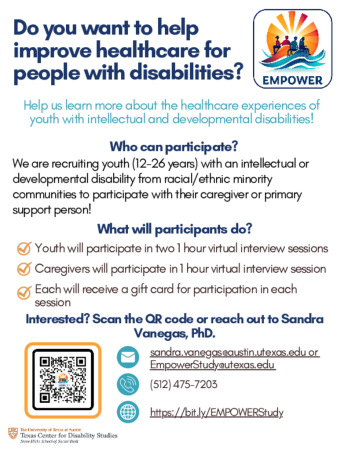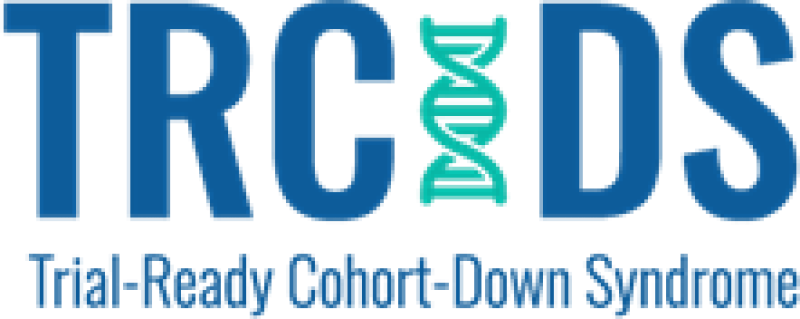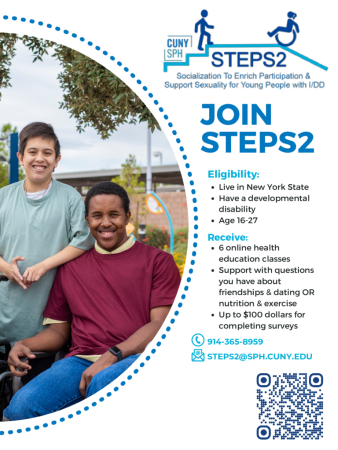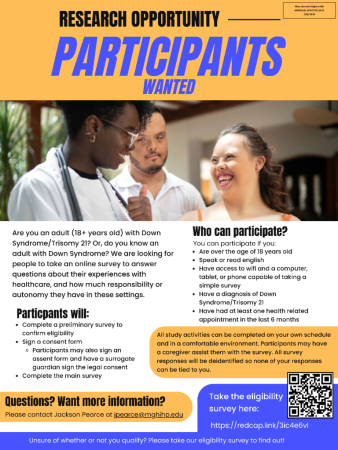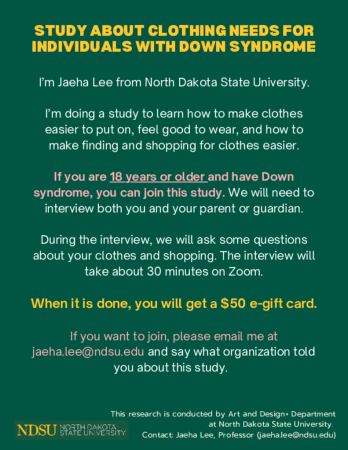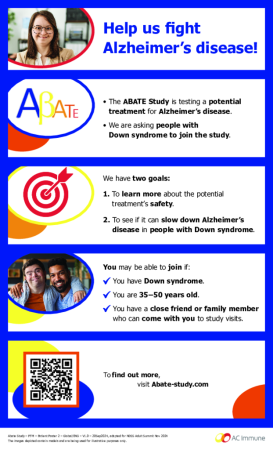The studies shared here have been submitted to NDSS by the researchers and have been reviewed for listing and suggested as information that may be of interest to caregivers and those with Down syndrome by members of our Scientific and Clinical Advisory Board. The SciCAB does not review or approve the study. That is documented by the Institutional Review Board of the relevant institution. NDSS does not endorse any study. Apply to have your study shared by clicking the box below.
Caregivers
Perspectives on and Experiences with Aging and Alzheimer's for Adults with Down Syndrome
Learn more
Learn More: This study aims to center the voices and experiences of adults with Down syndrome and their family members/caregivers to improve health and healthcare for this population. Participants must be an adult (18+) with Down syndrome or be a family member/caregiver of an adult with Down syndrome (18+). Participants will join a 90-minute focus group via Zoom, with up to 5 other individuals and take a short demographic survey. Participants will receive a $30 gift card for completing the study.
Contact Info
Caregivers’ perspectives on AAC acceptance, abandonment, and rejection
Learn more
Learn More: This online questionnaire and interview will explore caregivers’ perspectives on Augmentative and Alternative Communication (AAC). AAC describes multiple ways to communicate that can supplement or compensate (either temporarily or permanently) for the impairment and disability patterns of individuals with severe expressive communication disorders. This study will target caregivers of children with complex communication needs who have either accepted, rejected, or abandoned their individual’s use of AAC. Caregivers must be 18 years or older to participate. However, the individual who was suggested to use AAC and they are responsible for can be of any age. Participants who consent to participate in this study will complete an online questionnaire to understand their views and experiences related to their individual's use of AAC. Zoom interviews will be conducted with caregivers who want to have more in-depth conversations regarding their individual's AAC use.
Contact Info
Parent Survey to Develop a Measure of Maladaptive Behavior for Down Syndrome (BIDS-Phase 2)
Learn more
We are inviting caregivers of children with Down syndrome 2 to 17 years old, to be part of something truly important. Did you know that we have no good tool to measure challenging behaviors among children with Down syndrome? We're on a mission to create the first-ever tool measuring challenging behavior that is specifically made FOR children with Down syndrome and created WITH the Down syndrome community. We’re calling this measure BIDS - the Behavior Inventory for Down Syndrome. So far the Down syndrome community has shared what concerns them and helped make the tool shorter. To make the best tool possible, now we need YOUR help. The BIDS survey is designed to understand your child's behavior better. We want to know the BEST way to ask the question, so some questions may sound the same. Your answers will help us choose the best one. This research study is led by clinical researchers at Cincinnati Children’s Hospital (Anna Esbensen, PhD) and at Children’s Hospital Colorado (Lina Patel, PsyD). Together, we can make a difference. Join us in shaping a brighter future for children with Down syndrome. To learn more, or get started, please see the details below: Who qualifies? Caregivers of a child with Down syndrome ages 2 to 17 years who live in the USA. What is involved? Eligible caregivers complete a confidential online survey regarding how often behaviors occur and how severe certain behavioral concerns are. Caregivers also complete a supplemental survey about basic demographic information and their child’s medical conditions. The survey will take about 20-50 minutes to complete, and you can return to the survey if needed. Some caregivers will be asked to fill out other surveys about behavior, or complete the BIDS 2 weeks later. You will be paid for your time completing our surveys.
Interested? Please click on the following link when you are ready to start the survey: redcap.link/BIDS2
Si prefiere hacer la encuesta en español, haga clic aquí: redcap.link/BIDS2_es
Thank you! Caregivers will be compensated up to $45 for their time ($25 for the required surveys and an additional $20 for the optional surveys). Watch the video below for more information.
English video link: BIDS | Cincinnati Children's (youtube.com)
Spanish video link: BIDS (Spanish) | Cincinnati Children's (youtube.com)
Contact Info

Assessment of the Sleep Care Priorities of Adolescents & Young Adults with Down Syndrome
Learn more
The goal of this study is to gain insight into the needs of preferences of teens and young adults with Down syndrome ages 13 to 21 years old to develop a sleep health intervention. Participation in this study will include a 15-minute survey that parents are caregivers will complete. Teens and young adults will participate in a virtual interview. The interview will be done using Zoom and will last around 30 minutes. Participants will be asked questions about their sleep and to share any ideas they have about how to teach other teens and young adults with Down syndrome about sleep. Parents or caregivers will also complete a 60-minute Zoom interview and will be asked about the teen/young adult's sleep, the parent's own sleep, and input on designing a sleep health intervention. Parents or caregivers and teens or young adults with Down syndrome will both receive a $20 gift card for participating.
Contact Info
Understanding Integrated Supports for Community Living and Participation Among Adults with Intellectual and Developmental Disabilities (IDD) and Their Families
Learn more
The research aims to explore barriers and facilitators to accessing supports. The research may yield information to inform policy and practice so better supports can be provided to adults with IDD. Participants must be 18 years or older and either be an adult with IDD or a family member of an adult with IDD. Participants will complete a survey and an interview. Both will take around 1.5 hours and can be completed virtually.
Contact Info
Birth-4 year olds
Infant Brain Imaging Study for Down Syndrome
Learn more
- This study’s goal is to increase our understanding of how the brain is affected in infants with and without Down syndrome. This may in turn provide clues that could eventually help identify therapeutic targets for intervention for individuals with Down syndrome.
- Who is eligible? Families with an infant (6 months or younger) diagnosed with Down syndrome. Expectant parents are encouraged to contact us.
-
About your visit: Your infant and a parent will:
-
Travel to your region’s site when your infant is 6, 12, and 24 months old. Each visit includes developmental assessments and an MRI scan during natural sleep (no sedation).
-
Receive reimbursement for study-related expenses and up to $300 compensation per visit.
-
Website: www.dsstudies.com.
For more information please contact: ibis@wustl.edu
BRIDGE Study (BRain Indicators of Developmental Growth)
Learn more
Researchers in the Down Syndrome Program & the Labs of Cognitive Neuroscience at Boston Children’s Hospital are recruiting young children between 2 and 5 years old, with Down Syndrome (DS) to participate in a study investigating how differences in brain activity affect learning, language, and behavior in DS. This is for Children aged 24-66 months with Down syndrome.
What will you do?
2 visits, each one year apart, at the Labs of Cognitive Neuroscience at Boston Children’s Hospital.
Each visit includes clinical and behavioral assessments that will evaluate your child’s thinking, motor skills, language skills, and social communication. In addition, we will measure your child’s brain activity using electroencephalography (EEG).
EEG is a safe and radiation-free way to measure brain activity in response to different sounds and pictures.
What will you receive?
Families will receive a small toy and $50 per visit for participating. We will provide free parking and child care for siblings.
Families will receive a written report about their child’s development. Families can learn more about the lab by visiting wherekidshelpkids.org.
Contact Info
Development of Supported Stepping in Infants with Down Syndrome
Learn more
PURPOSE: To learn about the development of walking with mobility devices in infants and toddlers with Down Syndrome
WHAT IS INVOLVED: Tests of your child's motor skills and observation of your child taking steps on a treadmill and with a mobility device
WHO CAN PARTICIPATE: Children with Down Syndrome (10-22 months of age) who cannot walk independently
COMPENSATION: Families will receive $25 per 60-90 minute lab visit (up to 5 visits).
Contact Info
CAPEabilities: Communication and Play Early
Learn more
Children age 17-24 months with Down syndrome are invited to participate. We are studying how play and communication skills develop and connect to health and other conditions. Participation involves 1 to 2 research visits per year. Visits can be scheduled at locations and times that are convenient to families.
Contact Info
Parent Survey to Develop a Measure of Maladaptive Behavior for Down Syndrome (BIDS-Phase 2)
Learn more
We are inviting caregivers of children with Down syndrome 2 to 17 years old, to be part of something truly important. Did you know that we have no good tool to measure challenging behaviors among children with Down syndrome? We're on a mission to create the first-ever tool measuring challenging behavior that is specifically made FOR children with Down syndrome and created WITH the Down syndrome community. We’re calling this measure BIDS - the Behavior Inventory for Down Syndrome. So far the Down syndrome community has shared what concerns them and helped make the tool shorter. To make the best tool possible, now we need YOUR help. The BIDS survey is designed to understand your child's behavior better. We want to know the BEST way to ask the question, so some questions may sound the same. Your answers will help us choose the best one. This research study is led by clinical researchers at Cincinnati Children’s Hospital (Anna Esbensen, PhD) and at Children’s Hospital Colorado (Lina Patel, PsyD). Together, we can make a difference. Join us in shaping a brighter future for children with Down syndrome. To learn more, or get started, please see the details below: Who qualifies? Caregivers of a child with Down syndrome ages 2 to 17 years who live in the USA. What is involved? Eligible caregivers complete a confidential online survey regarding how often behaviors occur and how severe certain behavioral concerns are. Caregivers also complete a supplemental survey about basic demographic information and their child’s medical conditions. The survey will take about 20-50 minutes to complete, and you can return to the survey if needed. Some caregivers will be asked to fill out other surveys about behavior, or complete the BIDS 2 weeks later. You will be paid for your time completing our surveys.
Interested? Please click on the following link when you are ready to start the survey: redcap.link/BIDS2
Si prefiere hacer la encuesta en español, haga clic aquí: redcap.link/BIDS2_es
Thank you! Caregivers will be compensated up to $45 for their time ($25 for the required surveys and an additional $20 for the optional surveys). Watch the video below for more information.
English video link: BIDS | Cincinnati Children's (youtube.com)
Spanish video link: BIDS (Spanish) | Cincinnati Children's (youtube.com)
Contact Info
5-18 year olds
Weight-Related Behaviors and Down Syndrome
Learn more
-
We are enrolling children who are between 5-18 years of age and are diagnosed with Down syndrome for a national study that will examine energy expenditure and weight-related behaviors (nutrition, sleep ,and activity).
For more information please contact: Dr. Michele Polfuss at mpolfuss@uwm.edu or (920) 470-2150
Contact Info
Down Syndrome Umbrella Study
Learn more
This study was created to capture individuals with Down syndrome who either don’t qualify or aren’t interested in our our studies. This is an a la carte study where you can pick and choose what you’d like to do. Do as little or as much as you’d like!
- Participants with Down syndrome ages 18 and older
- Must have Study Partner
- Questionnaires
- Minimal Cognitive Testing
- Blood Work
- Stool Sample
Contact Brittany Nelson @ 314-747-8425 for more information.
Website: https://anceslab.wustl.edu/for-participants/active-studies/
Contact Info
Parent Survey to Develop a Measure of Maladaptive Behavior for Down Syndrome (BIDS-Phase 2)
Learn more
We are inviting caregivers of children with Down syndrome 2 to 17 years old, to be part of something truly important. Did you know that we have no good tool to measure challenging behaviors among children with Down syndrome? We're on a mission to create the first-ever tool measuring challenging behavior that is specifically made FOR children with Down syndrome and created WITH the Down syndrome community. We’re calling this measure BIDS - the Behavior Inventory for Down Syndrome. So far the Down syndrome community has shared what concerns them and helped make the tool shorter. To make the best tool possible, now we need YOUR help. The BIDS survey is designed to understand your child's behavior better. We want to know the BEST way to ask the question, so some questions may sound the same. Your answers will help us choose the best one. This research study is led by clinical researchers at Cincinnati Children’s Hospital (Anna Esbensen, PhD) and at Children’s Hospital Colorado (Lina Patel, PsyD). Together, we can make a difference. Join us in shaping a brighter future for children with Down syndrome. To learn more, or get started, please see the details below: Who qualifies? Caregivers of a child with Down syndrome ages 2 to 17 years who live in the USA. What is involved? Eligible caregivers complete a confidential online survey regarding how often behaviors occur and how severe certain behavioral concerns are. Caregivers also complete a supplemental survey about basic demographic information and their child’s medical conditions. The survey will take about 20-50 minutes to complete, and you can return to the survey if needed. Some caregivers will be asked to fill out other surveys about behavior, or complete the BIDS 2 weeks later. You will be paid for your time completing our surveys.
Interested? Please click on the following link when you are ready to start the survey: redcap.link/BIDS2
Si prefiere hacer la encuesta en español, haga clic aquí: redcap.link/BIDS2_es
Thank you! Caregivers will be compensated up to $45 for their time ($25 for the required surveys and an additional $20 for the optional surveys). Watch the video below for more information.
English video link: BIDS | Cincinnati Children's (youtube.com)
Spanish video link: BIDS (Spanish) | Cincinnati Children's (youtube.com)
Contact Info

Assessment of the Sleep Care Priorities of Adolescents & Young Adults with Down Syndrome
Learn more
The goal of this study is to gain insight into the needs of preferences of teens and young adults with Down syndrome ages 13 to 21 years old to develop a sleep health intervention. Participation in this study will include a 15-minute survey that parents are caregivers will complete. Teens and young adults will participate in a virtual interview. The interview will be done using Zoom and will last around 30 minutes. Participants will be asked questions about their sleep and to share any ideas they have about how to teach other teens and young adults with Down syndrome about sleep. Parents or caregivers will also complete a 60-minute Zoom interview and will be asked about the teen/young adult's sleep, the parent's own sleep, and input on designing a sleep health intervention. Parents or caregivers and teens or young adults with Down syndrome will both receive a $20 gift card for participating.
Contact Info
Improving Sleep and Quality of Life in Individuals with Down Syndrome and their Caregivers
Learn more
You can join this study conducted by Dr. Caroline G. Richter at the University of Alabama at Birmingham (UAB) to adapt a virtual Mindfulness-Based Therapy for Insomnia program for individuals with Down syndrome to improve sleep and quality of life. Participants must be 12-30 years old with a diagnosis of Down syndrome and experience sleep problems. The study involves 8 intervention sessions via zoom: 1x a week for 1 hour and wearing a Fitbit to measure sleep. Participants and their caregivers who fully complete the intervention period and surveys will receive $100 for the first assessment and $150 for the mid and final assessments ($400 total).
Contact Info
BRIDGE Study (BRain Indicators of Developmental Growth)
Learn more
Researchers in the Down Syndrome Program & the Labs of Cognitive Neuroscience at Boston Children’s Hospital are recruiting young children between 2 and 5 years old, with Down Syndrome (DS) to participate in a study investigating how differences in brain activity affect learning, language, and behavior in DS. This is for Children aged 24-66 months with Down syndrome.
What will you do?
2 visits, each one year apart, at the Labs of Cognitive Neuroscience at Boston Children’s Hospital.
Each visit includes clinical and behavioral assessments that will evaluate your child’s thinking, motor skills, language skills, and social communication. In addition, we will measure your child’s brain activity using electroencephalography (EEG).
EEG is a safe and radiation-free way to measure brain activity in response to different sounds and pictures.
What will you receive?
Families will receive a small toy and $50 per visit for participating. We will provide free parking and child care for siblings.
Families will receive a written report about their child’s development. Families can learn more about the lab by visiting wherekidshelpkids.org.
Contact Info
Respiratory Neural Drive in Down Syndrome
Learn more
The purpose of this study is to investigate how control of breathing is different in children with Down Syndrome than children without Down syndrome. This study looks at respiratory neural drive in children with Down syndrome ages 10 to 17 years old and will help medical professionals understand and address these challenges, helping to enhance physical health and reduce preventable complications. Travel to Philadelphia is required, participation will take around 2-3 hours, and participants will receive a $50 gift card plus the cost of parking.
Contact Info
The Relationship Between Language and Executive Function in Developmental Language Disorder and Fragile X Syndrome Over Time
Learn more
Researchers at the Sounds2Syntax Lab at the University of Massachusetts Amherst in partnership with The University of Wisconsin Madison are conducting a study funded by the National Institutes of Health that aims to investigate how executive functions are related to language skills in children with language impairment. S2S Lab is recruiting children with Down syndrome that are 9-17 years of age who speak in at least 2–3-word phrases.
Contact Info
Breaking Barriers: Enhancing Clothing Accessibility for Individuals with Down Syndrome
Learn more
This study aims to improve clothing accessibility and comfort for individuals with Down syndrome, enhancing their quality of life and independence. Participants must be 18 years or older and Participants will complete an online survey about their experiences with clothing and shopping. Participants will also take body measurements with the assistance of a parent, guardian, or another person, following a video tutorial provided in the survey using a soft, flexible measuring tape to record their body measurements. Participation is virtual and all participants will receive a $20 gift card after completing the survey.
Contact Info
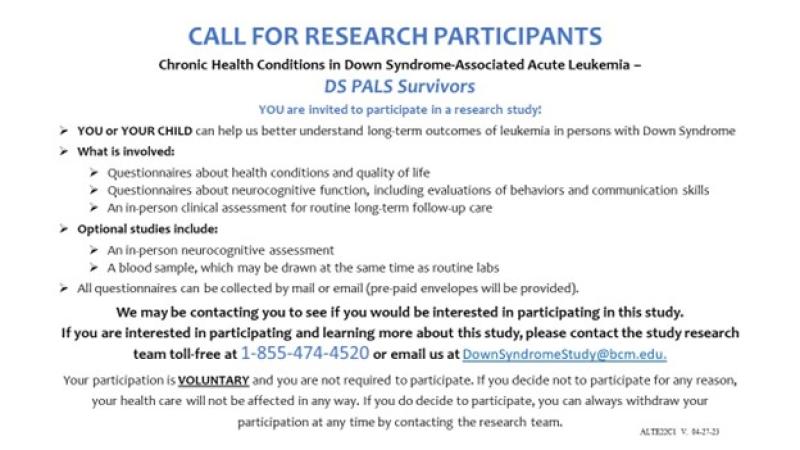
Chronic Health Conditions in Down Syndrome-Associated Acute Leukemia
Learn more
The DS PALS Survivors study is looking to better understand long-term outcomes of leukemia in individuals with Down syndrome. Participants will be asked to fill out questionnaires and attend an in-person clinical assessment.
Contact Info: Call toll free at 1-855-474-4520 or email at DownSyndromeStudy@bcm.edu
Contact Info
Play to Move
Learn more
The purpose of this study is to determine if children and adolescents age 5-18 with Down syndrome will be more motivated to participate in physical activity with an augmented-reality exercise gaming app compared to a paper handout with suggested exercises. The entire study will last 3 months. AU research will be conducted virtually via Zoom.
Contact Info
Assent Study in Down syndrome (LEAD-DS)
Learn more
The study’s goal is to improve the way we engage individuals with Down syndrome in conversations about healthcare and empower them in medical decision-making. We are inviting teens and young adults with Down syndrome and their caregivers to participate in this study that seeks to improve the way we explain research studies to individuals with Down syndrome.
Teens and young adults with Down syndrome between 14-30 years old are invited, and must be English or Spanish speakers to participate. Participants will be asked to provide feedback on our study materials. You will also be asked to complete questionnaires and two 1-hour audio-recorded interviews. Both parent and teen/young adult input is valuable to our research. Participation will be compensated.
The study can be completed in person or remotely.
Contact Info
Exploring Parent and Caregiver Perspectives on Friendship and Psychological Well-Being among Third to Sixth Graders with Down Syndrome
Learn more
The research survey will take 40 minutes to complete. They are looking for parents/caregivers of Canadian 3rd to 6th graders with Down syndrome to share
their views on their child’s friendships and mental well-being. If your child is entering Grade 3 this fall you can participate!
Contact Info
Evaluation and Measurement of healthcare transition Preparedness, Opportunities, and Wellness in Racially/Ethnically Diverse Youth with IDD (EMPOWER) Study
Learn more
This study aims to improve healthcare transition for youth with intellectual and developmental disabilities including Down syndrome from racial/ethnic minority communities. We are looking for youth aged 12-26 with an intellectual or development disability from racial/ethnic minority communities to participate with their caregiver or primary support person. Youth with IDD will participate in two 1-hour virtual interview sessions, and caregivers will participate in a 1-hour virtual interview session. All interviews will be conducted virtually, so travel is not required. Each participant will receive a gift card for completing each interview.
Contact Info
Randomized Controlled Trial of Quillivant in IDD with ADHD
Learn more
The study hopes to expand resources available to individuals with Down syndrome by evaluating the feasibility and reliability of the NIHTB-CB in populations with intellectual and developmental disabilities. Researchers aim to learn whether innovative tests that measure focus and thinking are sensitive to the FDA approved ADHD medication Quillivant XR in individuals with intellectual or developmental disabilities. Participants must be between 6-24 years of age, have an intellectual or developmental disability, and have ADHD or symptoms of ADHD. Participants will receive $25 for completing the screening, $50 for each completed in-person visit, and $100 gift card for iBehavior observations. In-person visits will take place at Rush University Medical Center in Chicago, IL.
Contact Info
19-29 year olds
Down Syndrome Umbrella Study
Learn more
This study was created to capture individuals with Down syndrome who either don’t qualify or aren’t interested in our our studies. This is an a la carte study where you can pick and choose what you’d like to do. Do as little or as much as you’d like!
- Participants with Down syndrome ages 18 and older
- Must have Study Partner
- Questionnaires
- Minimal Cognitive Testing
- Blood Work
- Stool Sample
Contact Brittany Nelson @ 314-747-8425 for more information.
Website: https://anceslab.wustl.edu/for-participants/active-studies/
Contact Info

The Longitudinal Investigation for the Enhancement of Down Syndrome Research (LIFE-DSR)
Learn more
Solving some of the biggest medical challenges of the Down syndrome community is a huge task. LuMind needs people with Down syndrome ages 25 years and older and their caregivers to help do it! The LIFE-DSR study aims to collect the medical, physical, and behavioral data of 270 adults with DS to address major community concerns including the high rate of Alzheimer’s disease.
This study does not involve a trial of new medications or therapies. The goal of LIFE-DSR is to understand Down syndrome better by gathering data to answer questions such as, “Why do so many people with Down syndrome develop Alzheimer’s disease and how can we prevent it from happening?”
Interested in learning more? Get more details and download an informational flyer at https://dsctn.org/life-dsr/.
Contact Info
Randomized Controlled Trial of Quillivant in IDD with ADHD
Learn more
The study hopes to expand resources available to individuals with Down syndrome by evaluating the feasibility and reliability of the NIHTB-CB in populations with intellectual and developmental disabilities. Researchers aim to learn whether innovative tests that measure focus and thinking are sensitive to the FDA approved ADHD medication Quillivant XR in individuals with intellectual or developmental disabilities. Participants must be between 6-24 years of age, have an intellectual or developmental disability, and have ADHD or symptoms of ADHD. Participants will receive $25 for completing the screening, $50 for each completed in-person visit, and $100 gift card for iBehavior observations. In-person visits will take place at Rush University Medical Center in Chicago, IL.
Contact Info

Assessment of the Sleep Care Priorities of Adolescents & Young Adults with Down Syndrome
Learn more
The goal of this study is to gain insight into the needs of preferences of teens and young adults with Down syndrome ages 13 to 21 years old to develop a sleep health intervention. Participation in this study will include a 15-minute survey that parents are caregivers will complete. Teens and young adults will participate in a virtual interview. The interview will be done using Zoom and will last around 30 minutes. Participants will be asked questions about their sleep and to share any ideas they have about how to teach other teens and young adults with Down syndrome about sleep. Parents or caregivers will also complete a 60-minute Zoom interview and will be asked about the teen/young adult's sleep, the parent's own sleep, and input on designing a sleep health intervention. Parents or caregivers and teens or young adults with Down syndrome will both receive a $20 gift card for participating.
Contact Info
Improving Sleep and Quality of Life in Individuals with Down Syndrome and their Caregivers
Learn more
You can join this study conducted by Dr. Caroline G. Richter at the University of Alabama at Birmingham (UAB) to adapt a virtual Mindfulness-Based Therapy for Insomnia program for individuals with Down syndrome to improve sleep and quality of life. Participants must be 12-30 years old with a diagnosis of Down syndrome and experience sleep problems. The study involves 8 intervention sessions via zoom: 1x a week for 1 hour and wearing a Fitbit to measure sleep. Participants and their caregivers who fully complete the intervention period and surveys will receive $100 for the first assessment and $150 for the mid and final assessments ($400 total).
Contact Info
Trial-Ready Cohort-Down Syndrome
Learn more
The Trial-Ready Cohort-Down Syndrome, or TRC-DS, matches people with Down syndrome to clinical trials related to Alzheimer’s disease. TRC-DS routinely monitors study participants for any changes to their brain health or function over time through blood tests and brain imaging to eventually match them with applicable Alzheimer’s disease clinical trials. Because participants are routinely evaluated, researchers can fast-track them for enrollment into qualifying clinical studies as soon as they are eligible and matched with one.
Healthy adults between the ages of 25 and 55 with Down syndrome are eligible to participate. Participants will visit their nearest research center once every 16 months for physical exams (like blood pressure checks and blood draws), memory skills tests, and brain scans to measure changes in their brain health and function.
Visit https://www.trcds.org/ and find the research center nearest you.
Contact Info
Understanding Integrated Supports for Community Living and Participation Among Adults with Intellectual and Developmental Disabilities (IDD) and Their Families
Learn more
The research aims to explore barriers and facilitators to accessing supports. The research may yield information to inform policy and practice so better supports can be provided to adults with IDD. Participants must be 18 years or older and either be an adult with IDD or a family member of an adult with IDD. Participants will complete a survey and an interview. Both will take around 1.5 hours and can be completed virtually.
Contact Info

Chronic Health Conditions in Down Syndrome-Associated Acute Leukemia
Learn more
The DS PALS Survivors study is looking to better understand long-term outcomes of leukemia in individuals with Down syndrome. Participants will be asked to fill out questionnaires and attend an in-person clinical assessment.
Contact Info: Call toll free at 1-855-474-4520 or email at DownSyndromeStudy@bcm.edu
Contact Info
Breaking Barriers: Enhancing Clothing Accessibility for Individuals with Down Syndrome
Learn more
This study aims to improve clothing accessibility and comfort for individuals with Down syndrome, enhancing their quality of life and independence. Participants must be 18 years or older and Participants will complete an online survey about their experiences with clothing and shopping. Participants will also take body measurements with the assistance of a parent, guardian, or another person, following a video tutorial provided in the survey using a soft, flexible measuring tape to record their body measurements. Participation is virtual and all participants will receive a $20 gift card after completing the survey.
Contact Info
Socialization to Enhance Participation and Support Sexuality (STEPS2)
Learn more
People aged 16-27 with intellectual or developmental disabilities who join the STEPS2 study will either receive Steps To Your Health (STYH) classes which teach about exercise and nutrition or Socialization To Enhance Participation and Support Sexuality (STEPS2) classes which teach about decision-making, sexual health and healthy relationships. All participants must be okay with doing either program since the toss of a coin will decide which class a participant will get. All classes take place once per week for 6 weeks for up to an hour on the computer (over Zoom or another video conferencing platform).
Contact Info
Assent Study in Down syndrome (LEAD-DS)
Learn more
The study’s goal is to improve the way we engage individuals with Down syndrome in conversations about healthcare and empower them in medical decision-making. We are inviting teens and young adults with Down syndrome and their caregivers to participate in this study that seeks to improve the way we explain research studies to individuals with Down syndrome.
Teens and young adults with Down syndrome between 14-30 years old are invited, and must be English or Spanish speakers to participate. Participants will be asked to provide feedback on our study materials. You will also be asked to complete questionnaires and two 1-hour audio-recorded interviews. Both parent and teen/young adult input is valuable to our research. Participation will be compensated.
The study can be completed in person or remotely.
Contact Info
Evaluation and Measurement of healthcare transition Preparedness, Opportunities, and Wellness in Racially/Ethnically Diverse Youth with IDD (EMPOWER) Study
Learn more
This study aims to improve healthcare transition for youth with intellectual and developmental disabilities including Down syndrome from racial/ethnic minority communities. We are looking for youth aged 12-26 with an intellectual or development disability from racial/ethnic minority communities to participate with their caregiver or primary support person. Youth with IDD will participate in two 1-hour virtual interview sessions, and caregivers will participate in a 1-hour virtual interview session. All interviews will be conducted virtually, so travel is not required. Each participant will receive a gift card for completing each interview.
Contact Info
Autonomy in Healthcare Decision-Making for Adults with Down Syndrome
Learn more
Are you an adult (18+ years old) with Down syndrome/Trisomy 21?Or, do you know an adult with Down syndrome? We are looking for people to take an online survey to answer questions about their experiences with healthcare, and how much responsibility or autonomy they have in these settings. All study activities can be completed on your own schedule and in a comfortable environment. Take the eligibility survey here: https://redcap.link/3ic4e6vl
Contact Info
Advancing Clothing Accessibility for Individuals with Down Syndrome: Optimizing Wearability and Shopping Experiences
Learn more
This study addresses the significant challenges faced by individuals with Down syndrome in accessing suitable clothing and participating fully in shopping experiences, which significantly impedes their engagement in professional and social activities. Adults with Down syndrome age 18+ and their caregivers will participate in a 30-minute Zoom interview. After completing the interview, participants will receive a $50 gift card.
Contact Info
Perspectives on and Experiences with Aging and Alzheimer's for Adults with Down Syndrome
Learn more
Learn More: This study aims to center the voices and experiences of adults with Down syndrome and their family members/caregivers to improve health and healthcare for this population. Participants must be an adult (18+) with Down syndrome or be a family member/caregiver of an adult with Down syndrome (18+). Participants will join a 90-minute focus group via Zoom, with up to 5 other individuals and take a short demographic survey. Participants will receive a $30 gift card for completing the study.
Contact Info
30+ year olds
Down Syndrome Umbrella Study
Learn more
This study was created to capture individuals with Down syndrome who either don’t qualify or aren’t interested in our our studies. This is an a la carte study where you can pick and choose what you’d like to do. Do as little or as much as you’d like!
- Participants with Down syndrome ages 18 and older
- Must have Study Partner
- Questionnaires
- Minimal Cognitive Testing
- Blood Work
- Stool Sample
Contact Brittany Nelson @ 314-747-8425 for more information.
Website: https://anceslab.wustl.edu/for-participants/active-studies/
Contact Info
Breaking Barriers: Enhancing Clothing Accessibility for Individuals with Down Syndrome
Learn more
This study aims to improve clothing accessibility and comfort for individuals with Down syndrome, enhancing their quality of life and independence. Participants must be 18 years or older and Participants will complete an online survey about their experiences with clothing and shopping. Participants will also take body measurements with the assistance of a parent, guardian, or another person, following a video tutorial provided in the survey using a soft, flexible measuring tape to record their body measurements. Participation is virtual and all participants will receive a $20 gift card after completing the survey.
Contact Info
The ABATE Study
Learn more
About 80 people with Down syndrome will take part in the ABATE Study. The study is testing an investigational vaccine for Alzheimer’s disease in people with Down syndrome. Contact: https://www.abate-study.com/ to find the study location nearest you.
We want to see:
- If the vaccine is safe
- How the vaccine works inside the body
- If it helps get rid of amyloid buildups
- If it slows down memory loss and thinking problems
You may be able to join this study if you:
- Have Down syndrome
- Are between 35 and 50 years old
- Have a study partner
Contact Info
Trial-Ready Cohort-Down Syndrome
Learn more
The Trial-Ready Cohort-Down Syndrome, or TRC-DS, matches people with Down syndrome to clinical trials related to Alzheimer’s disease. TRC-DS routinely monitors study participants for any changes to their brain health or function over time through blood tests and brain imaging to eventually match them with applicable Alzheimer’s disease clinical trials. Because participants are routinely evaluated, researchers can fast-track them for enrollment into qualifying clinical studies as soon as they are eligible and matched with one.
Healthy adults between the ages of 25 and 55 with Down syndrome are eligible to participate. Participants will visit their nearest research center once every 16 months for physical exams (like blood pressure checks and blood draws), memory skills tests, and brain scans to measure changes in their brain health and function.
Visit https://www.trcds.org/ and find the research center nearest you.
Contact Info

Chronic Health Conditions in Down Syndrome-Associated Acute Leukemia
Learn more
The DS PALS Survivors study is looking to better understand long-term outcomes of leukemia in individuals with Down syndrome. Participants will be asked to fill out questionnaires and attend an in-person clinical assessment.
Contact Info: Call toll free at 1-855-474-4520 or email at DownSyndromeStudy@bcm.edu
Contact Info
Socialization to Enhance Participation and Support Sexuality (STEPS2)
Learn more
People aged 16-27 with intellectual or developmental disabilities who join the STEPS2 study will either receive Steps To Your Health (STYH) classes which teach about exercise and nutrition or Socialization To Enhance Participation and Support Sexuality (STEPS2) classes which teach about decision-making, sexual health and healthy relationships. All participants must be okay with doing either program since the toss of a coin will decide which class a participant will get. All classes take place once per week for 6 weeks for up to an hour on the computer (over Zoom or another video conferencing platform).
Contact Info
Autonomy in Healthcare Decision-Making for Adults with Down Syndrome
Learn more
Are you an adult (18+ years old) with Down syndrome/Trisomy 21?Or, do you know an adult with Down syndrome? We are looking for people to take an online survey to answer questions about their experiences with healthcare, and how much responsibility or autonomy they have in these settings. All study activities can be completed on your own schedule and in a comfortable environment. Take the eligibility survey here: https://redcap.link/3ic4e6vl
Contact Info
Advancing Clothing Accessibility for Individuals with Down Syndrome: Optimizing Wearability and Shopping Experiences
Learn more
This study addresses the significant challenges faced by individuals with Down syndrome in accessing suitable clothing and participating fully in shopping experiences, which significantly impedes their engagement in professional and social activities. Adults with Down syndrome age 18+ and their caregivers will participate in a 30-minute Zoom interview. After completing the interview, participants will receive a $50 gift card.
Contact Info
Perspectives on and Experiences with Aging and Alzheimer's for Adults with Down Syndrome
Learn more
Learn More: This study aims to center the voices and experiences of adults with Down syndrome and their family members/caregivers to improve health and healthcare for this population. Participants must be an adult (18+) with Down syndrome or be a family member/caregiver of an adult with Down syndrome (18+). Participants will join a 90-minute focus group via Zoom, with up to 5 other individuals and take a short demographic survey. Participants will receive a $30 gift card for completing the study.
Contact Info
Understanding Integrated Supports for Community Living and Participation Among Adults with Intellectual and Developmental Disabilities (IDD) and Their Families
Learn more
The research aims to explore barriers and facilitators to accessing supports. The research may yield information to inform policy and practice so better supports can be provided to adults with IDD. Participants must be 18 years or older and either be an adult with IDD or a family member of an adult with IDD. Participants will complete a survey and an interview. Both will take around 1.5 hours and can be completed virtually.
Contact Info
Hero: A Study to Evaluate the Safety, Tolerability, and Pharmacokinetics (PK) and Pharmacodynamics (PD) of ION269 in Participants With Down Syndrome (DS) at Risk for Alzheimer's Disease (AD)
Learn more
The HERO study is a clinical trial for people with Down syndrome who are between 35 and 55 years old. Doctors and scientists are researching a new study medicine called ION269 for adults with Down syndrome who might get Alzheimer’s Disease. Alzheimer’s Disease is a brain disease that causes problems with thinking, learning, and remembering. We hope this study medicine will help people with Down syndrome not have problems with their memory as they get older. Participating in the HERO study could improve understanding of how to help individuals with Down syndrome in the future. Learn more by visiting the website.


